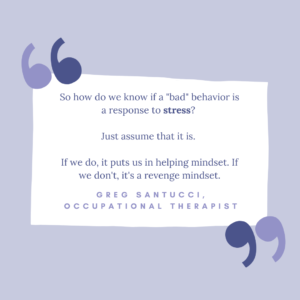
This quote sums up everything I’ve ever tried to say about “behavior” and does it so perfectly succinctly in four sentences.
What’s the best-case scenario? That instead of wanting to get revenge on children for the ways they act that inconvenience, bother, or annoy us, we start to soften. We start to see them empathetically. We start to genuinely feel our hearts change as we want to help them. Children who have been struggling, who have been hurting, who have been overlooked, who may not have any other adult in their life who’s “on their team” start to feel seen and heard.
What’s the worst-case scenario? That a child who isn’t actually in any kind of distress manages to pull one over on us? That we miss an opportunity to get revenge on a kid for being annoying? I can’t even think of one here that makes sense.
I think what we are actually afraid of is that the worst-case scenario is that our best isn’t good enough. That our empathy doesn’t solve everything for a child whose life is scary and stressful in too many ways…and that the child behaving like they’re in stress becomes an adult behaving like they’re in stress, and something scary in life could happen because of that.
It could. That happens every day. So we mistakenly think that maybe we can fix it by “getting back at” the child earlier in life…before our whole broken society, our whole broken world, can “get back at” an adult who does something wrong.
But that’s not how it works. We don’t have to preemptively break kids so that the world won’t break them later on. On the contrary, when we tell ourselves a truer story about what the child is doing (they’re stressed, they’re hurting, they need help), then it becomes the story we tell the child about what they’re doing (you’re stressed, you’re hurting, you need help). And when the child grows up, it becomes the story they tell themselves: I’m stressed, I’m hurting, I need help.
Not “I’m bad”
Not “I’m lazy”
Not “I’m a piece of crap”
Not “things are going wrong, yeah, I deserve that”
…but I’m stressed, I’m hurting, I need help.
And then they know, too, that there are people who can help. Because we helped when they needed it before.
(The quote in this meme was taken, with permission, from Greg Santucci, Occupational Therapist’s original post here.)

